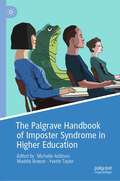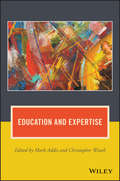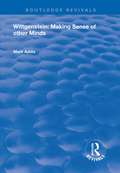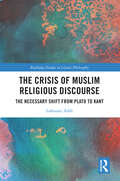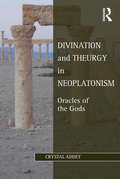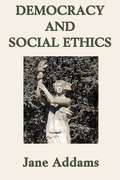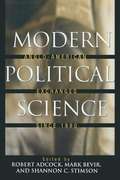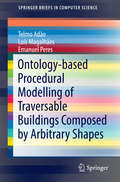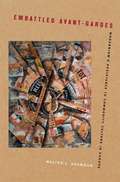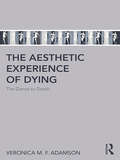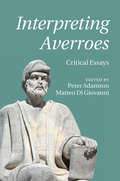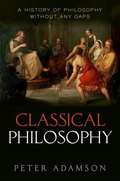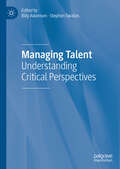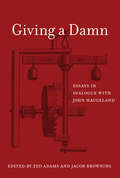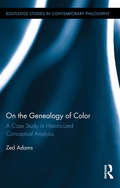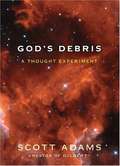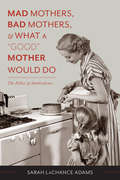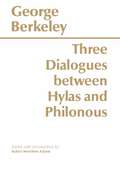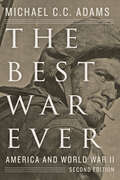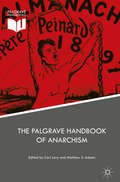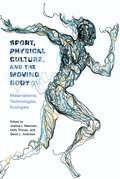- Table View
- List View
The Palgrave Handbook of Imposter Syndrome in Higher Education
by Michelle Addison Yvette Taylor Maddie BreezeThis handbook explores feeling like an ‘imposter’ in higher education and what this can tell us about contemporary educational inequalities. Asking why imposter syndrome matters now, we investigate experiences of imposter syndrome across social locations, institutional positions, and intersecting inequalities. Our collection queries advice to fit-in with the university, and authors reflect on (not)belonging in, with and against educational institutions. The collection advances understandings of imposter syndrome as socially situated, in relation to entrenched inequalities and their recirculation in higher education. Chapters combine creative methods and linger on the figure of the ‘imposter’ - wary of both individualising and celebrating imposters as lucky, misfits, fraudsters, or failures, and critically interrogating the supposed universality of imposter syndrome.
Education and Expertise (Journal of Philosophy of Education)
by Mark Addis Christopher WinchThe relevance of expertise to professional education and practice is explored in this collection of original contributions from educationalists, philosophers and psychologists. <p><p> Discusses the increasingly prominent debates about the nature of know-how in mainstream analytical epistemology <p> Illuminates what is involved in professional expertise and the implications of a sound understanding of professional expertise for professional education practice, curriculum design and assessment <p> All contributions are philosophically grounded and reflect interdisciplinary advances in understanding expertise
Wittgenstein: Making Sense of Other Minds (Routledge Revivals)
by Mark AddisOriginally published in 1999, Wittgenstein: Making Sense of Other Minds explores human relations and the issues raised by one immensely influential response to the problems generated by the claims about the existence and properties of other minds. How do we justify the interpretations which we place on other people's behaviour? Is my mind the only real mind? Is there a difference between the way in which I understand m mind and that of another person? This book explores Wittgenstein's theories, critiquing and analysing them, including chapters on the concept of criteria, grammar in the middle and late period, and the blue book and later work.
The Crisis of Muslim Religious Discourse: The Necessary Shift from Plato to Kant (Routledge Studies in Islamic Philosophy)
by Lahouari AddiShowing that Muslim societies are facing a crisis that is more cultural than religious, this book focuses on cultural representations through which social life is experienced in the Muslim world. It brings a new theoretical framework to address the secularization process that is underway and the contradictions it entails. This volume will arouse a new debate on secularization and the relations between religion, culture and philosophy. The crisis Muslim societies are undergoing pertains to the culture and not to the Qur’an to the extent that people do not have access to the sacred in itself but only for oneself, meaning a cultural interpretation of the sacred. The Qur’an in itself is not an obstacle to secularization and modernization since any sacred text is experienced through culture. If we consider the European experience where secularization has first emerged, we see that culture has been transformed from medieval metaphysics to modern philosophy upholding a civic culture. Discussing secularization through cultural representation, this book launches new ideas that fill an important gap in the literature on secularization. It is a key resource for any readers interested in religious studies, philosophy and the anthropology of religion.
Divination and Theurgy in Neoplatonism: Oracles of the Gods (Studies in Philosophy and Theology in Late Antiquity)
by Crystal AddeyWhy did ancient philosophers consult oracles, write about them, and consider them to be an important part of philosophical thought and practice? This book explores the extensive links between oracles and philosophy in Late Antiquity, particularly focusing on the roles of oracles and other forms of divination in third and fourth century CE Neoplatonism. Examining some of the most significant debates between pagan philosophers and Christian intellectuals on the nature of oracles as a central yet contested element of religious tradition, Addey focuses particularly on Porphyry's Philosophy from Oracles and Iamblichus' De Mysteriis - two works which deal extensively with oracles and other forms of divination. This book argues for the significance of divination within Neoplatonism and offers a substantial reassessment of oracles and philosophical works and their relationship to one another. With a broad interdisciplinary approach, encompassing Classics, Ancient Philosophy, Theology, Religious Studies and Ancient History, Addey draws on recent anthropological and religious studies research which has challenged and re-evaluated the relationship between rationality and ritual.
Democracy and Social Ethics
by Jane AddamsJane Addams was a pioneer settlement worker, public philosopher, sociologist, author, and leader in woman suffrage and world peace. Beside presidents such as Theodore Roosevelt and Woodrow Wilson, she was the most prominent reformer of the Progressive Era and helped turn the nation to issues of concern to mothers, such as the needs of children, public health, and world peace. In 1931 she became the first American woman to be awarded the Nobel Peace Prize.
Modern Political Science: Anglo-American Exchanges Since 1880
by Robert Adcock Mark Bevir Shannon C. StimsonSince emerging in the late nineteenth century, political science has undergone a radical shift--from constructing grand narratives of national political development to producing empirical studies of individual political phenomena. What caused this change? Modern Political Science--the first authoritative history of Anglophone political science--argues that the field's transformation shouldn't be mistaken for a case of simple progress and increasing scientific precision. On the contrary, the book shows that political science is deeply historically contingent, driven both by its own inherited ideas and by the wider history in which it has developed. Focusing on the United States and the United Kingdom, and the exchanges between them, Modern Political Science contains contributions from leading political scientists, political theorists, and intellectual historians from both sides of the Atlantic. Together they provide a compelling account of the development of political science, its relation to other disciplines, the problems it currently faces, and possible solutions to these problems. Building on a growing interest in the history of political science, Modern Political Science is necessary reading for anyone who wants to understand how political science got to be what it is today--or what it might look like tomorrow.
Ontology-based Procedural Modelling of Traversable Buildings Composed by Arbitrary Shapes
by Telmo Adão Luís Magalhães Emanuel PeresThis book presents a new procedural modelling methodology capable of producing traversable buildings constrained by arbitrary convex shapes, based on a pure treemap approach. The authors establish a process to change the format of interior rooms, through wall number modification and offer an adaptation of a "fake-concave" technique to support non-convex building layouts. It will also include: * A proposal for an extensible building ontology to guide the methodology process and support the generation of other architectural style buildings (e. g. roman houses); * A presentation of an ontology-based grammar to provide the procedural modelling methodology with production rules; * Experimental computer managed processes for the stochastic generation of buildings. Most of the existing solutions regarding building interiors only focus on the generation of floor plans mainly composed of rectangular shapes. Yet there are a wide variety of ancient and contemporary buildings that are composed of shapes other than rectangles, both internally and externally. Ontology-based Traversable Buildings Composed by Arbitrary Shapes will address this by providing the Procedural Modelling field with processes and techniques capable of properly supporting for example, digital preservation of cultural heritage or extensive virtual urban environment productions, specifically ones involving the generation/reconstruction of virtual buildings with such geometric requirements.
Embattled Avant-Gardes: Modernism's Resistance to Commodity Culture in Europe
by Walter AdamsonThis book provides a bold new perspective on a movement that defined the cultural landscape of the early twentieth century. Walter L. Adamson embarks on a lucid, wide-ranging exploration of the avant-garde practices through which the modernist generations coming after 1900 resisted the rise of commodity culture as a threat to authentic cultural expression.
The Aesthetic Experience of Dying: The Dance to Death
by Veronica M. AdamsonStructured around a personal account of the illness and death of the author’s partner, Jane, this book explores how something hard to bear became a threshold to a world of insight and discovery. Drawing on German Idealism and Jane’s own research in the area, The Aesthetic Experience of Dying looks at the notion of life as a binary synthesis, or a return enhanced, as a way of coming to understand death. Binary synthesis describes the interplay between dynamically opposing pairs of concepts – such as life and death – resulting in an enhanced version of one of them to move forward in a new cycle of the process. Yet what relevance does this elegant word game have to the shocking diagnosis of serious illness? Struggling to balance reason with sense, thought with feeling, this book examines the experience of caring for someone from diagnosis to death and is illustrated with examples of the return enhanced. The concluding chapter outlines how the tension of Jane’s dying has been resolved as the rhythmic patterns of the lifeworld have been understood through the process of reflecting on the experience. This creative and insightful book will appeal to those interested in the medical humanities. It will also be an important reference for practising and student health professionals.
Arabic Philosophy
by Peter Adamson Richard C. TaylorRepresenting one of the great traditions of Western philosophy, philosophy written in Arabic and in the Islamic world was inspired by Greek philosophical works and the indigenous ideas of Islamic theology. This collection of essays, by some of the leading scholars in Arabic philosophy, provides an introduction to the field by way of chapters devoted to individual thinkers (such as al-Farabi, Avicenna and Averroes) or groups, especially during the 'classical' period from the ninth to the twelfth centuries.
Interpreting Averroes: Critical Essays
by Peter Adamson Matteo Di GiovanniThis volume brings together world-leading scholars on the thought of Averroes, the greatest medieval commentator on Aristotle but also a major scholar of Islam. The collection situates him in his historical context by emphasizing the way that he responded to the political situation of twelfth-century Islamic Spain and the provocations of Islamic theology. It also sheds light on the interconnections between aspects of his work that are usually studied separately, such as his treatises on logic and his legal writings. Advanced students and scholars will find authoritative and insightful treatments of Averroes' philosophy, tackled from multiple perspectives and written in a clear and accessible way that will appeal to those encountering his work for the first time as well as to anyone looking for new critical approaches to Averroes and his thinking.
Classical Philosophy: A History of Philosophy Without Any Gaps (A History of Philosophy #Volume 1)
by Peter AdamsonEarly Greek Philosophy Socrates and Plato Aristotle
Interpreting Avicenna
by Peter AdamsonAvicenna is the greatest philosopher of the Islamic world. His immense impact on Christian and Jewish medieval thought, as well as on the subsequent Islamic tradition, is charted in this volume alongside studies which provide a comprehensive introduction to and analysis of his philosophy. Contributions from leading scholars address a wide range of topics including Avicenna's life and works, conception of philosophy and achievement in logic and medicine. His ideas in the main areas of philosophy, such as epistemology, philosophy of religion and physics, are also analyzed. While serving as a general introduction to Avicenna's thought, this collection of critical essays also represents the cutting edge of scholarship on this most influential philosopher of the medieval era.
Managing Talent: Understanding Critical Perspectives
by Billy Adamsen Stephen SwailesThis edited collection offers a critical appreciation of talent management in contrast to the extensive literature adopting mainstream approaches to the topic. The authors explore fundamental questions in the field to better understand why managing talent seems so attractive as a management practice, the meaning of talent, and how talent is recognised in organisations. The mix of conceptual and empirical chapters in the book teases out some critical perspectives that will provoke thought and reflection among practitioners and stimulate ideas for new research topics and approaches. The diverse contributions presented in this book will undoubtedly be of use to academics, practitioners and postgraduate students of human resource management.
Giving a Damn: Essays in Dialogue with John Haugeland (The\mit Press Ser.)
by Zed Adams Jacob BrowningA collection of essays that use John Haugeland's work on intentionality, embodiment, objectivity, and caring to explore contemporary issues in philosophy of mind.In his work, the philosopher John Haugeland (1945–2010) proposed a radical expansion of philosophy's conceptual toolkit, calling for a wider range of resources for understanding the mind, the world, and how they relate. Haugeland argued that “giving a damn” is essential for having a mind—suggesting that traditional approaches to cognitive science mistakenly overlook the relevance of caring to the understanding of mindedness. Haugeland's determination to expand philosophy's array of concepts led him to write on a wide variety of subjects that may seem unrelated—from topics in cognitive science and philosophy of mind to examinations of such figures as Martin Heidegger and Thomas Kuhn. Haugeland's two books with the MIT Press, Artificial Intelligence and Mind Design, show the range of his interests.This book offers a collection of essays in conversation with Haugeland's work. The essays, by prominent scholars, extend Haugeland's work on a range of contemporary topics in philosophy of mind—from questions about intentionality to issues concerning objectivity and truth to the work of Heidegger. Giving a Damn also includes a previously unpublished paper by Haugeland, “Two Dogmas of Rationalism,” as well as critical responses to it. Finally, an appendix offers Haugeland's outline of Kant's "Transcendental Deduction of the Categories.” ContributorsZed Adams, William Blattner, Jacob Browning, Steven Crowell, John Haugeland, Bennett W. Helm, Rebecca Kukla, John Kulvicki, Mark Lance, Danielle Macbeth, Chauncey Maher, John McDowell, Joseph Rouse
On the Genealogy of Color: A Case Study in Historicized Conceptual Analysis (Routledge Studies in Contemporary Philosophy)
by Zed AdamsIn On the Genealogy of Color, Zed Adams argues for a historicized approach to conceptual analysis, by exploring the relevance of the history of color science for contemporary philosophical debates about color realism. Adams contends that two prominent positions in these debates, Cartesian anti-realism and Oxford realism, are both predicated on the assumption that the concept of color is ahistorical and unrevisable. Adams takes issue with this premise by offering a philosophical genealogy of the concept of color. This book makes a significant contribution to recent debates on philosophical methodology by demonstrating the efficacy of using the genealogical method to explore philosophical concepts, and will appeal to philosophers of perception, philosophers of mind, and metaphysicians.
God's Debris: A Thought Experiment
by Scott Adams"God's Debris" is a set of provocative questions (thought experiments) about God and science, wrapped in a fictional story. It is designed to inspire readers to question their views of reality.
Mad Mothers, Bad Mothers, and What a "Good" Mother Would Do
by Sarah Lachance AdamsWhen a mother kills her child, we call her a bad mother, but, as this book shows, even mothers who intend to do their children harm are not easily categorized as "mad" or "bad." Maternal love is a complex emotion rich with contradictory impulses and desires, and motherhood is a conflicted state in which women constantly renegotiate the needs mother and child, the self and the other. Applying care ethics philosophy and the work of Emmanuel Levinas, Maurice Merleau-Ponty, and Simone de Beauvoir to real-world experiences of motherhood, Sarah LaChance Adams throws the inherent tensions of motherhood into sharp relief, drawing a more nuanced portrait of the mother and child relationship than previously conceived. The maternal example is particularly instructive for ethical theory, highlighting the dynamics of human interdependence while also affirming separate interests. LaChance Adams particularly focuses on maternal ambivalence and its morally productive role in reinforcing the divergence between oneself and others, helping to recognize the particularities of situation, and negotiating the difference between one's own needs and the desires of others. She ultimately argues maternal filicide is a social problem requiring a collective solution that ethical philosophy and philosophies of care can inform.
Three Dialogues Between Hylas and Philonous
by Robert M. Adams George BerkeleyA model of what an edition of a philosohic text for an introductory level should be. Introduction does an admirable job of putting Berkeley's thought in the intellectual context of its time. --Gary C. Hatfield
Habermas and Theology
by Nicholas AdamsHow can the world's religious traditions debate within the public sphereï 1/2 In this book Nicholas Adams shows the importance of Habermas' approaches to this question. The full range of Habermas' work is considered, with detailed commentary on the more difficult texts. Adams energetically rebuts some of Habermas' arguments, particularly those which postulate the irrationality or stability of religious thought. Members of different religious traditions need to understand their own ethical positions as part of a process of development involving ongoing disagreements, rather than a stable unchanging morality. Public debate additionally requires learning each other's patterns of disagreement. Adams argues that rather than suspending their deep reasoning to facilitate debate, as Habermas suggests, religious traditions must make their reasoning public, and that 'scriptural reasoning' is a possible model for this. Habermas overestimates the stability of religious traditions. This book offers a more realistic assessment of the difficulties and opportunities they face.
The Best War Ever: America and World War II (The American Moment)
by Michael C. AdamsThe most readable—and searingly honest—short book ever written on this pivotal conflict.Was World War II really such a "good war"? Popular memory insists that it was, in fact, "the best war ever." After all, we knew who the enemy was, and we understood what we were fighting for. The war was good for the economy. It was liberating for women. A battle of tanks and airplanes, it was a "cleaner" war than World War I. Although we did not seek the conflict—or so we believed—Americans nevertheless rallied in support of the war effort, and the nation's soldiers, all twelve million of them, were proud to fight. But according to historian Michael C. C. Adams, our memory of the war era as a golden age is distorted. It has left us with a misleading—even dangerous—legacy, one enhanced by the nostalgia-tinged retrospectives of Stephen E. Ambrose and Tom Brokaw. Disputing many of our common assumptions about the period, Adams argues in The Best War Ever that our celebratory experience of World War II is marred by darker and more sordid realities. In the book, originally published in 1994, Adams challenges stereotypes to present a view of World War II that avoids the simplistic extremes of both glorification and vilification. The Best War Ever charts the complex diplomatic problems of the 1930s and reveals the realities of ground combat: no moral triumph, it was in truth a brutal slog across a blasted landscape. Adams also exposes the myth that the home front was fully united behind the war effort, demonstrating how class, race, gender, and age divisions split Americans. Meanwhile, in Europe and Asia, shell-shocked soldiers grappled with emotional and physical trauma, rigorously enforced segregation, and rampant venereal disease.In preparing this must-read new edition, Adams has consulted some seventy additional sources on topics as varied as the origins of Social Security and a national health system, the Allied strategic bombing campaign, and the relationship of traumatic brain injuries to the adjustment problems of veterans. The revised book also incorporates substantial developments that have occurred in our understanding of the course and character of the war, particularly in terms of the human consequences of fighting. In a new chapter, "The Life Cycle of a Myth," Adams charts image-making about the war from its inception to the present. He contrasts it with modern-day rhetoric surrounding the War on Terror, while analyzing the real-world consequences that result from distorting the past, including the dangerous idea that only through (perpetual) military conflict can we achieve lasting peace.
Constitutionalism and the Rule of Law
by Maurice Adams Anne Meuwese Ballin Ernst HirschRule of law and constitutionalist ideals are understood by many, if not most, as necessary to create a just political order. Defying the traditional division between normative and positive theoretical approaches, this book explores how political reality on the one hand, and constitutional ideals on the other, mutually inform and influence each other. Seventeen chapters from leading international scholars cover a diverse range of topics and case studies to test the hypothesis that the best normative theories, including those regarding the role of constitutions, constitutionalism and the rule of law, conceive of the ideal and the real as mutually regulating.
The Palgrave Handbook of Anarchism
by Matthew S. Adams Carl LevyThis handbook unites leading scholars from around the world in exploring anarchism as a political ideology, from an examination of its core principles, an analysis of its history, and an assessment of its contribution to the struggles that face humanity today. Grounded in a conceptual and historical approach, each entry charts what is distinctive about the anarchist response to particular intellectual, political, cultural and social phenomena, and considers how these values have changed over time. At its heart is a sustained process of conceptual definition and an extended examination of the core claims of this frequently misunderstood political tradition. It is the definitive scholarly reference work on anarchism as a political ideology, and should be a crucial text for scholars, students, and activists alike.
Sport, Physical Culture, and the Moving Body: Materialisms, Technologies, Ecologies (Critical Issues in Sport and Society)
by Mary Louise Adams Kiri Baxter Douglas Booth Kyle S Bunds Michael D. Giardina Mariana Clark Simon C Darnell Samantha Frost Simone Fullagar Pirkko Markula Mary G. McDonald Jennifer Sterling Christopher McLeod Matthew G. Hawzen Richard Pringle Oliver Rick Jacob J. Bustad Samantha King Shannon Leigh Jette Katelyn Esmonde David Andrews Carolyn Pluim Gavin WeedonThe moving body—pervasively occupied by fitness activities, intense training and dieting regimes, recreational practices, and high-profile sporting mega-events—holds a vital function in contemporary society. As the body moves—as it performs, sweats, runs, and jumps—it sets in motion an intricate web of scientific rationalities, spatial arrangements, corporate imperatives, and identity politics (i.e. politics of gender, race, social class, etc.). It represents vitality in its productive and physiological capacities, it drives a complex economy of experiences and products, and it is a meaningful site of cultural identities and politics. Contributors to Sport, Physical Culture, and the Moving Body work from a simple premise: as it moves, the material body matters. Adding to the burgeoning fields of sport studies and body studies, the works featured here draw upon the traditions of feminist theory, posthumanism, actor network theory, and new materialism to reposition the physical, moving body as crucial to the cultural, political, environmental, and economic systems that it constitutes and within which is constituted. Once assembled, the book presents a study of bodies in motion—made to move in contexts where technique, performance, speed, strength, and vitality not only define the conduct therein, but provide the very reason for the body’s being within those economies and environments. In so doing, the contributors look to how the body moving for and about rational systems of science, medicine, markets, and geopolity shapes the social and material world in important and unexpected ways. In Sport, Physical Culture, and the Moving Body, contributors explore the extent to which the body, when moving about both ostensibly active body spaces (i.e., the gymnasium, the ball field, exercise laboratory, the track or running trail, the beach, or the sport stadium) and those places less often connected to physical activity (i.e. the home, the street, the classroom, the automobile), is bounded to technologies of life and living; and to the political arrangements that seek to capitalize upon such frames of biological vitality. To do so, the authors problematize the rise of active body science (i.e. kinesiology, sport and exercise sciences, performance biotechnology) and the effects these scientific interventions have on embodied, lived experience. Contributors to Sport, Physical Culture, and the Moving Body will be engaging a range of new and emerging theoretical perspectives, including new materialist, political ecology, developmental systems theory, and new material feminist approaches, to examine the actors and assemblages of movement-based material, political, and economic production. In so doing, contributors will vividly and powerfully illustrate the extent to which a focus on the fleshed body and its material conditions can bring forth new insights or ontological and epistemological innovation to the sociology of sport and physical activity. They will also explore the agency of the body as and amongst things. Such a performative materialist approach explicates how complex assemblages of sport and physical activity—bringing into association everything from muscle fibers and dietary proteins to stadium concrete or regional aquifers—are not only meaningful, but ecological. By focusing on the confluence of agentive materialities, disciplinary technologies, vibrant assemblages, speculative realities, and vital performativities, Sport, Physical Culture, and the Moving Body promises to offer a groundbreaking departure from representationalist tendencies and orthodoxies brought about by the cultural turn in sport and physical cultural studies. It brings the moving body and its physics back into focus: recentering moving flesh and bones as locus of social order, environmental change, and the global political economy.
